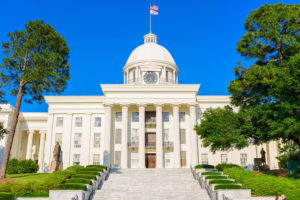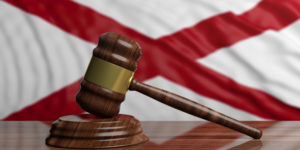
Alabama State Capital in Montgomery
Ignores Supreme Court Decision Hinting Otherwise
O’Brien v. Mobile Pub. Lib., 2022 WL 829245 (Ala. App. 2022).
Workers’ compensation subrogation remains an intense struggle between the powers of good and evil; with insurance carriers attempting to preserve their rights to seek reimbursement of claim payments made necessary through the negligent acts of tortfeasors and the employee’s attorney doing everything in his power to destroy those rights. Hanging in the balance of this tug of war is the reduction of the experience modifiers and ultimately workers’ compensation premium reductions in coming years for businesses small and large throughout the country. This struggle spills over into political arenas as well, with Democratic-leaning legislatures and judges passing laws and making rulings which eliminate subrogation rights for the “wealthy” insurance companies in the hopes of passing on those additional savings to the injured employee. Nowhere is this political and legal tug of war more evident than in the great state of Alabama.
Since 1971, the law has been fairly clear that a workers’ compensation carrier has no right of recovery from uninsured or underinsured motorist benefits received by the employee from the employee’s own personal auto policy.[1] With regard to subrogating against UM/UIM benefits paid under the employer’s auto policy, however, there has long been a great deal of confusion and disagreement. While the decision in Cahoon stated flatly that a compensation carrier is not subrogated to UM/UIM benefits, that case involved UM/UIM payments made under the employee’s personal automobile insurance policy and was decided prior to a 1992 amendment to § 25-5-11(a), referring to “circumstances…creating a legal liability for damages on the part of any party other than the employer.” Clearly, an accident with an UM or UIM tortfeasor creates legal liability on the part of the UM/UIM carrier.
 Meanwhile, a second Alabama Supreme Court decision, issued in 2003, seemed to clearly establish that a workers’ compensation carrier is subrogated to UM/UIM benefits paid under the employer’s auto policy.[2] The Watts decision was fairly clear when it indicated that that any recovery of UM benefits from an employer’s UM/UIM policy would be “subject to the employer’s right to reimbursement for the compensation paid on account of the employee’s injury.” However, trial lawyers have argued the Watts case was actually dealing with the issue of exclusive remedy protection of the employer with regard to an employee making a claim for workers’ compensation benefits and a simultaneous claim for UM/UIM benefits under the employer’s auto policy. They claim that the italicized language above from the Watts opinion was actually “dicta”—opinions of a judge or appellate panel that do not embody the resolution or determination of the specific issue before the court. For many years the Cahoon decision was cited as authority for disallowing subrogation against UM/UIM benefits from the employer’s auto policy, even though that case dealt with an employee’s policy. Later, the Watts decision—which clearly supporting allowing workers’ compensation subrogation against benefits paid by an employer’s policy—was discounted as having made that comment only in “dicta”.
Meanwhile, a second Alabama Supreme Court decision, issued in 2003, seemed to clearly establish that a workers’ compensation carrier is subrogated to UM/UIM benefits paid under the employer’s auto policy.[2] The Watts decision was fairly clear when it indicated that that any recovery of UM benefits from an employer’s UM/UIM policy would be “subject to the employer’s right to reimbursement for the compensation paid on account of the employee’s injury.” However, trial lawyers have argued the Watts case was actually dealing with the issue of exclusive remedy protection of the employer with regard to an employee making a claim for workers’ compensation benefits and a simultaneous claim for UM/UIM benefits under the employer’s auto policy. They claim that the italicized language above from the Watts opinion was actually “dicta”—opinions of a judge or appellate panel that do not embody the resolution or determination of the specific issue before the court. For many years the Cahoon decision was cited as authority for disallowing subrogation against UM/UIM benefits from the employer’s auto policy, even though that case dealt with an employee’s policy. Later, the Watts decision—which clearly supporting allowing workers’ compensation subrogation against benefits paid by an employer’s policy—was discounted as having made that comment only in “dicta”.
The 2013 Court of Appeals decision in Roblero v. Cox Pools did not specifically decide whether Cahoon or Watts applied in that case, because the employee failed to argue on appeal that the trial court erred in concluding that the employer’s subrogation and credit rights apply to the UM/UIM.[3] The court did state, in a concurring opinion, however, as follows:
Any concern that the employee will retain a double recovery should be allayed because, on remand, the employer will be entitled to reduce its workers’ compensation liability by the amount of the uninsured-motorist benefits, subject, of course, to payment of its fair portion of the employee’s attorney’s fees. See § 25–5–11(e), Ala. Code 1975.[4]
The Watts decision was clear in stating that an injured employee may recover UM/UIM benefits directly from the employer, subject to the employer’s right to reimbursement for the compensation paid on account of the employee’s injury to the extent of the employee’s recovery of damages against the third-party tortfeasor.[5]
On March 18, 2022, the Court of Appeals in O’Brien v. Mobile Public Library decided a case in which Aaron Mosley was injured while working for Mobile Public Library and simultaneously recovered workers’ compensation benefits and UM benefits from his employer’s automobile insurance company.[6] The worker’s compensation carrier sought reimbursement from the UM carrier. The employer argued that it had a subrogation lien for $37,270.14 against the UM coverage. The trial court agreed with the employer and pointed to the Roblero and Watts decisions.
The trial court discounted Cahoon and Bunkley because they were decided on a statute that predated the 1992 amendment. It relied on the more recent Watts and Roblero decisions, stating:
While it is true that older Alabama caselaw interpreting the issue of whether an employer can subrogate under these facts goes against the employer, and while it is also true that as of this date, none of those cases have been reversed, it is also true that more recent Alabama Supreme Court and Alabama Court of Civil Appeals cases with facts almost identical to ours have held that an employer can subrogate against [an uninsured-motorist insurance] recovery by an injured employee — up to the amount paid in comp benefits.
Mosley appealed and the Court of Appeals reversed the trial court. It said that the issue in Watts was not was not whether Watts’s employer or its workers’ compensation carrier were entitled to subrogation against or reimbursement from any recovery by Watts from the employer’s UM carrier. The issue was simply whether the UM carrier could preclude Watts’s recovery based on the exclusive remedy defense. Thus, the Court of Appeals felt that the clear statement by the supreme court in Watts that Watts’s recovery was “subject to the employer’s right to reimbursement for the compensation paid on account of the employee’s injury to the extent of the employee’s recovery of damages against the third-party tortfeasor,” clearly was “dicta.”
Relying on Cahoon and other cases which relied on Cahoon, the Court of Appeals held that the trial court erred by allowing the employer subrogation rights against the UM benefits. With regard to the danger of a double recovery, the court held that the solution that issue falls to the legislature.
Despite the lengthy and somewhat convoluted O’Brien decision which trial lawyers will argue puts this issue to rest, until the Alabama Supreme Court weighs in on the issue directly, it appears that confusion remains.
If you should have any questions regarding this article or subrogation in general, please contact James Busenlener at jbusenlener@mwl-law.com.
[1] Bunkley v. Bunkley Air Conditioning, Inc., 688 So.2d 827 (Ala. App. 1996); State Farm v. Cahoon, 252 So.2d 619 (Ala. 1971).
[2] Watts v. Sentry Ins., 876 So.2d 440 (Ala. 2003).
[3] Roblero v. Cox Pools of Southeast, Inc., 133 So.3d 904 (Ala. App. 2013).
[4] Id.
[5] Id.
[6] O’Brien v. Mobile Pub. Lib., 2022 WL 829245 (Ala. App. 2022).






